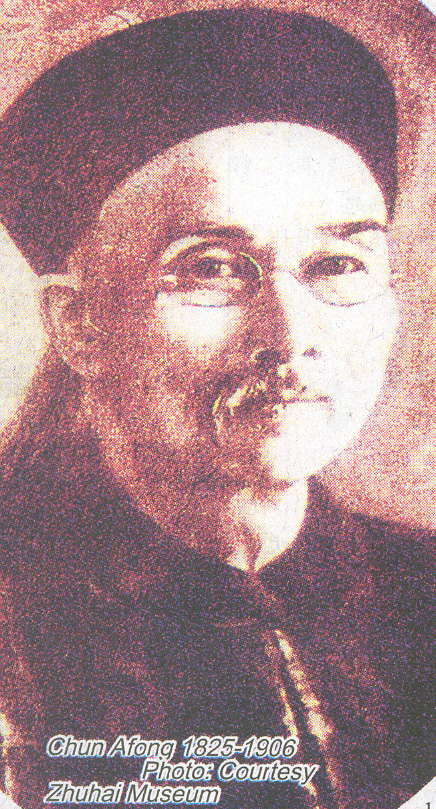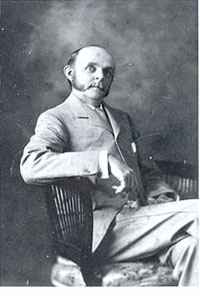Hawaii - Chun Afong & Mr. Damon
1. Chun Afong
Extract from Simon's Letter:-
My Dear Sister-in-law,
You will see from the name of the place where this is written that I am back again on the old plantation.
Mr. Afong has had a great deal of trouble with his engineers since I have been away and with a great deal of persuasion I consented to come up and set things to rights for him, although I had fully made up my mind to have nothing more to do with plantation business. I have had 4 more planters who are anxious to engage me, but I told them that I had given up the business.......
... I am superintending the erection of a new vacuum pan for Mr. Afong and intend to go down to Honolulu as soon as it is completed. "
 Chun Afong and the Pepe`ekeo Sugar Plantation
Chun Afong and the Pepe`ekeo Sugar Plantation
Sometime
between 1857 and 1861, the highly successful Honolulu businessman Chun
Afong (1825-1906) acquired the Kaupakuea Sugar Plantation and Mill. It
consisted of 1,500 acres ten miles north of Hilo. In addition, in 1879
he acquired Makahaula Plantation on 7,600 acres at the southern border
of Kaupakuea Plantation. By 1882 Afong had combined the two into
Pepe`ekeo Sugar Mill and Plantation Company.Chun Afong came to Hawaii from China in 1849 to work in his uncle’s store. He soon became a successful merchant on his own and also invested in sugar and coffee plantations. His stature increased to the point that in 1879 King Kalakaua appointed him a noble of the Kingdom. But a decade later, in 1889, the weary and aging Afong returned to his homeland, leaving his family in Honolulu and his affairs in the hands of his friend Samuel M. Damon (1845-1924), son of the pioneer preacher Samuel C. Damon.
Chun Afong Became First Qing Dynasty Consul to the Hawaiian Kingdom
Introduction:Aa a young man, Chun Afong made a fortune in the Honolulu cane sugar industry, becoming the richest overseas Chinese. Later, he married an aristocrat and ascended to noble class and high political circles. For 40 years he played a dominant role in business and politics elevating the international image of a Chinese businessman. In old age, he invested in the Hong Kong ferry industry and Macao wine-house trade and was devoted to his hometown in Zhuhai.
See full profile Source: net.zhuhai.gov.cn
2. Samuel M. Damon
Extract from Simon's Letter:-
"Pepedes, July 13th 1882My Dear Sister-in-law,
......I arrived here safely in May after a very pleasant passage from San Francisco. My business I found had been satisfactorily attended to by Mr. Damon during my absence, old friends expressed their gladness at my safe return and for the little time I stayed in Honolulu I had a "general good time"......."

Samuel M. Damon and the Bishop Bank
Samuel Mills Damon was a historical figure of great importance in Hawaii. He was the son of Samuel C. Damon and Julia Mills, and his father was an extraordinarily active missionary in Hawaii.
By 1869, Samuel M. Damon was busy as a clerk in the store of W.N. Ladd & Co.. Mr. Ladd died in 1869, and after the store was sold in 1870, Samuel wrote to his brother, Frank, saying, "Mr. C. R. Bishop asked me to make no settled engagements till I had seen him again. Last Saturday he called at the store and wished me to come down in a week and commence operations in the bank. Many of my best friends think it is a most excellent commencement and for my part I am highly pleased."
This was the beginning of Samuel's association with the Bishop Bank, which ultimately led to his sole ownership of the Bank in 1895.
See full profile source: Doyle New York
See details from $3.9m sale of his coin collection
Afong & Damon
Lava & Ships